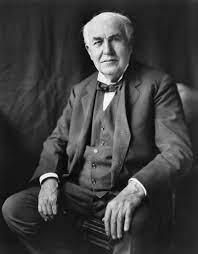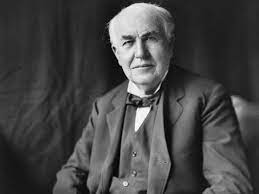
Thomas Edison
The world has been shaped by the brilliance of countless scientists who have revolutionized various fields of knowledge through their groundbreaking inventions. Among these notable figures stands Thomas Alva Edison, an American inventor, scientist, and businessman, who left an indelible mark on history through his numerous contributions. Edison’s remarkable inventions, unparalleled work ethic, and entrepreneurial spirit have had a profound impact on modern society, transforming the way we live, work, and communicate.

Thomas Edison was born on February 11, 1847, in Milan, Ohio, USA, to a modest family. His early years were marked by significant challenges, including hearing difficulties that led to his hearing loss in both ears. Despite these obstacles, young Edison displayed an insatiable curiosity and a penchant for experimentation. His formal education was brief and unconventional, with his mother acting as his primary educator. This informal education allowed him to explore various subjects and cultivate a deep love for learning.
One of Edison’s most influential inventions was the phonograph, patented in 1878. The phonograph was the first device capable of both recording and reproducing sound, effectively creating the foundation for the modern music and entertainment industry. Edison’s inspiration for the phonograph came from his desire to find a practical method for recording telephone messages. He made use of the principles of sound vibration and utilized a stylus to etch grooves on a rotating cylinder wrapped with tinfoil, capturing sound waves. To play back the recorded sound, the cylinder would be rotated under the stylus, producing the original sound. This invention revolutionized the way music and speech were preserved and enjoyed, forever changing the course of audio technology.
Perhaps Edison’s most renowned invention was the practical electric light bulb. Although he did not invent the concept of electric lighting, Edison’s relentless dedication led to the development of a commercially viable incandescent light bulb. After thousands of experiments with various materials, Edison and his team settled on a carbonized bamboo filament inside a vacuum-sealed glass bulb. This breakthrough allowed the bulb to glow for extended periods without burning out. In 1879, he successfully demonstrated his invention, and by 1880, he had secured a patent for his incandescent lamp. This invention brought about a monumental shift in society, eliminating the need for gas lamps and candles and paving the way for a safer and more efficient source of artificial lighting.
Edison’s electric light bulb revolutionized the way people lived and worked. Prior to its widespread adoption, homes and streets were dimly lit by gas lamps, and cities were often plagued by the hazards of gas leaks and fires. With the introduction of the electric light bulb, urban centers became brighter and safer, leading to increased productivity and extended working hours. Industries no longer had to rely on daylight to operate efficiently, ushering in an era of 24/7 production and boosting economic growth.
Additionally, the electric light bulb facilitated the growth of urbanization and allowed cities to expand beyond their former limits. Street lighting made nighttime navigation safer, enabling businesses to thrive during the evening hours. The advent of electric lighting also prompted the development of power generation and distribution systems, leading to the formation of electrical utilities and the electrification of entire communities.
The invention of the phonograph marked a pivotal moment in the history of entertainment and communication. Before the phonograph, music could only be enjoyed through live performances or sheet music. Edison’s device allowed for the recording and replaying of music, making it accessible to a broader audience. This innovation not only transformed the music industry but also laid the foundation for the audio recording industry that followed.
With the rise of the phonograph, artists and musicians gained new opportunities to reach audiences beyond their immediate locales. Recordings could be duplicated and distributed on a larger scale, facilitating the spread of music across different regions and even continents. This development led to the commercialization of music and the establishment of recording companies, shaping the modern music business as we know it today.
Moreover, the phonograph paved the way for other audio technologies, such as radio and later, digital audio formats. Without Edison’s pioneering work, the world might never have experienced the Cultural Revolution brought about by music and spoken word recordings.
Edison’s inventions not only transformed entertainment but also revolutionized communication methods. The phonograph allowed for voice recordings, opening new possibilities for oral communication. This innovation became especially significant in fields like education, where recorded lectures and speeches could be distributed more widely and accessed repeatedly.
The invention of the telephone was a major advancement in communication technology, and although Edison did not invent it, he made an important contributions to its development. His work on the carbon transmitter greatly improved the telephone’s sound quality, making it more practical and accessible for widespread use.
Furthermore, Edison’s work on the telegraph, a technology he improved and made more efficient, had a profound impact on long-distance communication. Telegraph systems allowed people to send messages across vast distances at unprecedented speed, revolutionizing the way news and information were disseminated. This laid the groundwork for future innovations in global communication networks.
Apart from his many inventions, Edison’s entrepreneurial spirit left a lasting impact on American industry. He founded General Electric (GE), one of the world’s largest multinational conglomerates, which continues to be a major player in various fields, including energy, healthcare, and aviation. Edison’s approach to innovation, with his emphasis on rigorous experimentation and development, served as a model for subsequent generations of inventors and entrepreneurs.
Thomas Edison’s impact on the world cannot be overstated. His remarkable inventions, particularly the phonograph and the electric light bulb, have reshaped modern society, influencing everything from the way we communicate and consume entertainment to the very infrastructure of our cities. Beyond his scientific achievements, Edison’s unwavering determination, work ethic, and entrepreneurial mindset have inspired generations of innovators to pursue their passions and change the world for the better.
As we look back on Edison’s legacy, we are reminded of the power of human ingenuity and perseverance. His story serves as a testament to the potential within each of us to make a lasting impact through our contributions to science, technology, and society. The world owes much to this notable scientist who illuminated both the literal and figurative darkness, leaving an enduring legacy that continues to inspire and guide future generations.
By: Mehwish
Write and Win: Participate in Creative writing Contest & International Essay Contest and win fabulous prizes.


